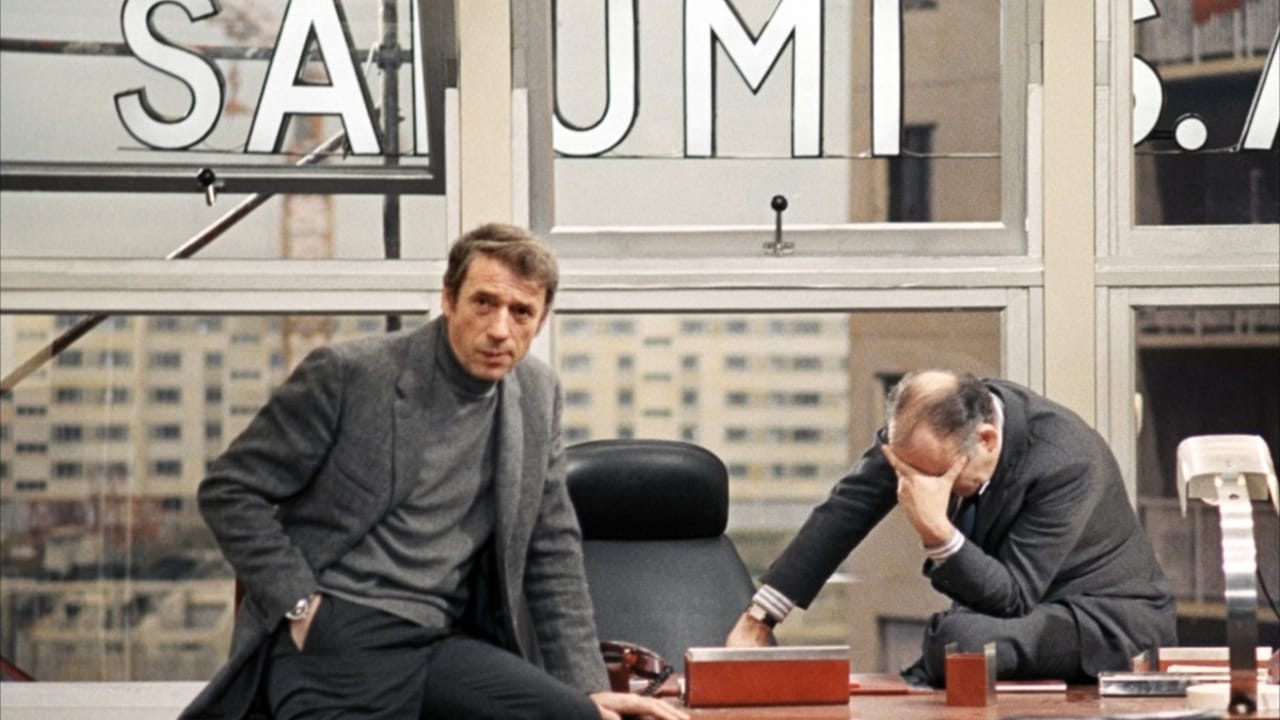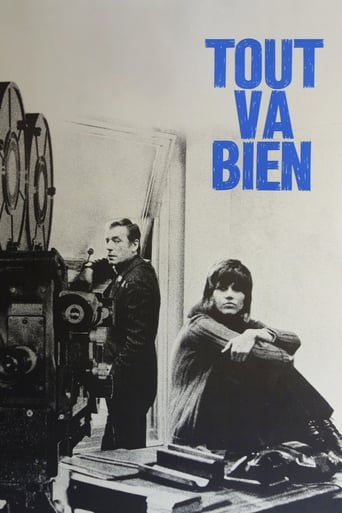



People are voting emotionally.
A Disappointing Continuation
if their story seems completely bonkers, almost like a feverish work of fiction, you ain't heard nothing yet.
View MoreThrough painfully honest and emotional moments, the movie becomes irresistibly relatable
View MoreIn 1967 the French director Jean-Luc Godard, whose recent films had been increasingly imbued with political concerns and an infatuation with Mao, stepped away entirely from conventional filmmaking (even in its zany French New Wave form). Joining with his fellow French Maoist Jean-Pierre Gorin, he shot a series of self-funded political tracts that remain little-known today except to extreme Godard completists. But in 1972, after these years in the comparative wilderness, Godard and Gorin got funding to make a bigger-budget picture, with established stars Jane Fonda and Yves Montand. As they planned, the film would initially go through the motions of being a commercial-entertainment picture, but then move into overtly ideological territory. The result was TOUT VA BIEN ("Everything's Fine").Fonda plays an American news correspondent in Paris. Montand is her husband, a former film director who sold out to shoot television commercials for consumer products. As the film opens the reporter, with her husband tagging along, arrives at a meat-processing plant where she had an appointment to interview the director (played by Italo-French comedic actor Vittorio Caprioli). This turns out to be the same day when the plant workers strike and barricade the manager in his office -- and Fonda and Montand end up being stuck in his office with him. The first half of the film consists of the workers stridently clashing with the manager, as well as their union representative who they feel is compromising too much with management. In the second part of the film, Fonda and Montand's experience in the factory, revealing their own guilt and dissatisfaction, opens a rift in their relationship.There is a lot of farce in the first half of the film, and a darkly humorous misanthropy. Godard may have been intrigued by the romance of revolutionary politics, but he depicts the workers as venial, squabbling people that are nearly as awful as the exploitative management. Godard and Gorin make heavy use of Brechtian alienation techniques here, where the audience is continually reminded that they are watching a staged drama, not real life. Thus the factory director reads his lines in a hyperbolic comedic fashion, while other performers seem to be reading their lines in improvised fashion off a sheet of paper offscreen. Fonda and Montand are not directed to act much at all, rather they mainly stand on screen as token "movie stars" and only observe the workers' action. Naturally, French Maoism has not aged well as a political ideology, and people today will see this as a time capsule of a past age in politics than a powerful for the present. Still, Godard and Gorin do capture some timeless truths about how hard it is for the working class to put its frustrations into words.In spite of being shot years into Godard's middle, "Maoist" period when he had supposedly left the New Wave behind entirely, from the very first frame one is likely to find this readily a continuation of his mid-1960s work. The visual aesthetic, i.e. the bright colours -- usually those of the French flag -- the way his actors are instructed to stand, and the general mise-en-scene are the same as his work from PIERROT LE FOU to WEEKEND. There is a reason for that: Godard had a serious motorcycle accident during the initial stages of the film, and while he was recuperating, Gorin had to do most of the directing. Gorin intentionally chose to emulate various bits of Godard's earlier films. This is important to note, because the 1970s would be a decade when Godard's visual style and editing would change dramatically, but due to Gorin's role this film looks backwards to early Godard instead of forward to late Godard. But even if it is a deliberate retread of earlier Godard, it is still visually gorgeous, and the elaborate shot in a hypermarket towards the end (by which Gorin imitated the car crash scene in WEEKEND) deserves to be acclaimed as one of cinema's great long takes.Another effect of Gorin's look to the past is that, if it weren't for shots of France outside the film's set, where we can see that the new fashions and music of the Seventies have come, a viewer might think this was a Sixties film. Nonetheless, there are some fresh things here, namely the appearance of feminist concerns (something generally missing from Sixties radicalism). With its repeated mentions of May 1968, TOUT VA BIEN also captures a very interesting moment in time, when May '68 was close enough to be relatively fresh, but far enough in the past that people could understand what a failure it had proved and wax nostalgically about it.TOUT VA BIEN has never been among Godard's most acclaimed films, and as I said, visually it is a sort of retread. Yet, I greatly enjoyed this film. For me, the mid-late 1960s and early 1970s were a very special time in French history (and in Western history more generally), and watching TOUT VA BIEN really does take one back to that era. I wouldn't recommend this to someone totally unfamiliar with Godard, but if you have seen all his New Wave work, then continue on to this.
View MoreI've read commentaries of it being a lesser or unaccessible Godard, but for me it was just astonishing; seriously this film is brilliant on so many levels. Sure is kind of in your face consumerism and capitalism critic, but it has beautiful imagery with interesting symbolism, narratively speaking the way the story is presented with it's long lateral takes (the supermarket tracking shot is awesome)and also the film within a film concept in a very unorthodox way (the way he reminds us it's all a film by showing us the that the factory is a set for example)was fascinating, Godard being represented (mocking himself?) by Montad in that scene where he's interviewed(the part in which Montad speaks about the nouvelle vague) and the beautiful use of color made for a haunting experience for me.
View MoreTOUT VA BIEN may very well be the most frustrating movie made by the interminably frustrating Jean Luc Godard. Jane Fonda and Yves Montand are the billed stars, but it's Godard's overwrought direction that dominates all. Per usual, he's bashing the bourgeoisie while pretending to stick up for the little man (in this case striking factory workers...makers of sausage no less!) Overzealous camera work aside (Godard does snag at least one technique from Jerry Lewis...he removes the "fourth wall" of the factory and gives a terrific view of multiple floors at once), this is a pretty lifeless movie. The acting is so-so. Fonda is OK, but Montand barely registers. The factory workers shout a lot.
View MoreAlthough I'm quite familiar with most of Jean-Luc Godard's career, there is that 1970s period where he completely abandoned commercialism in all its forms and made experimental political films with Jean-Pierre Gorin and others. Tout Va Bien is not an impossible work, but it is challenging and, even if you win that challenge, the rewards are fairly limited. But it's interesting work, and Godard's fractured cinematic imagination is definitely brilliant at times. The grocery store sequence near the end of the film is as cinematic ally accomplished and impressive as the tracking shot of the apocalyptic highway in Week-End. And I love the meta-cinematic material at the beginning, where the filmmakers discuss how they can make a political film about May '68 and how the movement has evolved in the following four years. Step on: hire some stars. With stars come money. Thus Yves Montand and Jane Fonda are recruited for that purpose. The longest segment of the film has the two stars trapped with the manager of a slaughterhouse as his workers bar him from leaving his office. Godard and Gorin have a set designed after that large-windowed apartment building in Tati's Playtime. Perhaps it is even the same exact set, remodeled a bit for the way they want to use it here? The new Criterion DVD includes a follow-up film, A Letter to Jane, which discusses the famous photograph of Fonda meeting with the Viet-Cong. It is nearly unwatchable, though, and I gave up after 15 or 20 minutes (it's 52 minutes of Godard and Gorin speechifying which is also prevalent (and hard to take) in Tout Va Bien, as well).
View More